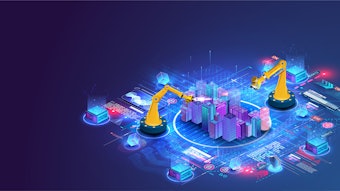
As the uncertainty and complexities associated with the building projects increase day by day, the need to switch to digital construction is compelling firms to take action. In fact, digitalization in the construction industry is long overdue and the pandemic has proved to be a catalyst towards this step. Construction technology is proving to be a vehicle of change in the current time where the need for real-time collaboration is paramount.
The construction industry is in a perfect storm and contractors and subcontractors alike from any field have many good reasons to adopt construction technology. Historically, the construction industry has been slow in adopting technology but it is primed to witness the integration of several digital technologies including machine learning, robotics within workflows, 3D printing, and building information modeling. Moreover, the benefits of digitalization in the construction industry include better productivity, improved profitability, and enhanced innovation capabilities of firms.
7 Reasons to Switch to Digital Construction
1. Mitigate Uncertainty to Achieve Project Goals
Lack of clarity can impact project progress and chances are confusion can hamper your overall goals. Construction technology promotes collaboration when you have remote teams and allows stakeholders to mitigate uncertainty. Whether it is carrying out financial risk analysis, handling documentation, and assisting with precise cost forecasting, going digital can streamline your business.
Besides a construction-specific software with intelligent transaction processing and unique analytical capabilities can handle growing complexities as and when they arise. To navigate rough waters in the times to come, bold moves such as switching to software solutions will reap more benefits in the future.
2. Customer-Centricity & Branding
Developing a compelling construction brand with distinctive values and attributes catering to future customers will have added importance. Construction brands that will deploy technology will be better positioned to deliver quality, service offerings, value, warranties, and reliability. The customer sites are also most likely to become capital-intensive and more productized construction companies are likely to develop innovative, new products. Hence, a shift to technology uptake can reap significant returns.
3. Improve Communication & Real-time Collaboration
With the help of digital technologies, you can keep all stakeholders informed in real-time. Also, it gives you the flexibility to monitor project progress and that it gets completed within the deadline.
Besides connectivity increases collaboration and also attracts a diverse workforce with different skill sets. Having access to plans and information, in turn, results in streamlining the business and better quality construction for clients.
Cloud-based construction software will continue to dominate the scene in 2022, allowing owners to access data anytime, anywhere. As cloud technology centralizes communication and allows owners to connect regardless of geographical constraints, firms that switch to cloud-based systems will reap the benefits.
4. Better Workflow & Document Tracking
Construction firms that will thrive amidst competition are likely to be those that can reduce inefficiencies, streamline processes and improve workflows. By going digital, firms can integrate data and do away with data silos, to bring in the much-needed visibility in the process.
Other than that, construction businesses that will automate and have integrated data will save significant time and increase return on investment. Tech solutions help you take care of documenting requirements with email tracking and alerts where pending change orders are concerned. Whether you need assistance with submittals, issues, notices, etc., construction technology will keep everyone on board in times to come.
5. Automation of Manual Tasks for Added Productivity
Taking the digital route is the best way to future-proof yourself against the competition. By automating time-consuming and repetitive tasks, you can leverage your construction firm to increase efficiency. Besides, construction firms that are willing to free up the time of their key resources so that they can contribute to the success of the business will survive the competition. This way digitalization is sure to make the workers more engaged and they can spend time on high-value tasks.
6. Streamline Business & Operations
In 2022, the tech will continue to help you streamline your business and construction operations. As the novel coronavirus is not expected to leave anytime soon, technological options like drones, robots, automated workflow tools, and enterprise resource planning systems will dominate the scene. Also by deploying tech-driven tools construction businesses can streamline their operations and need to quickly adapt to embrace the next normal. And the digital transformation is likely to impact the bottom line and help with customer retention in uncertain times.
7. Shift to Cloud Technologies Specific to Construction
Cloud is an established enabler for innovation. Construction companies that are keen on the wider adoption of cloud computing will improve resource utilization. Also, data can be stored securely and this step will meet the massive storage needs of contractors. Other than that data can be retrieved with no limitation to time and space also.
Not only this will continue to improve job site performance but also helps in improving various facets of construction company management. All in all cloud computing will dominate the digital world and construction companies utilizing cloud technology will soar above the competition.
The 'Next Normal'
Today the pandemic has created a significant shift for construction firms and tech adoption is the only way forward to embrace the "next normal." Digitalization will also enable construction managers to define new business and operating models and fundamentally reinvent themselves. To eliminate inefficient processes that plague the industry’s productivity caused by ineffective communication and inaccurate project data, going digital is the only way forward. By leveraging construction technology one can seize the incredible financial opportunities that 2022 will usher in, as cost savings can no longer be ignored.
To create a competitive edge and value, companies that familiarize themselves with the next normal will successfully ride the wave. Besides, the benefits of digital transformation in the construction industry are many, and bold and agile moves are needed on the part of construction firms. The size of the prize is enormous, and only construction firms can decide where they want to play and how they want to act as we approach 2022.
Ed Williams is the Senior Team Lead at ProjectPro, an integrated construction accounting software. He holds massive industry experience and is a Microsoft Dynamics expert who is focused on successful implementations. He is a visionary leader and always aims to deliver the best to the construction and project-oriented industries.






























